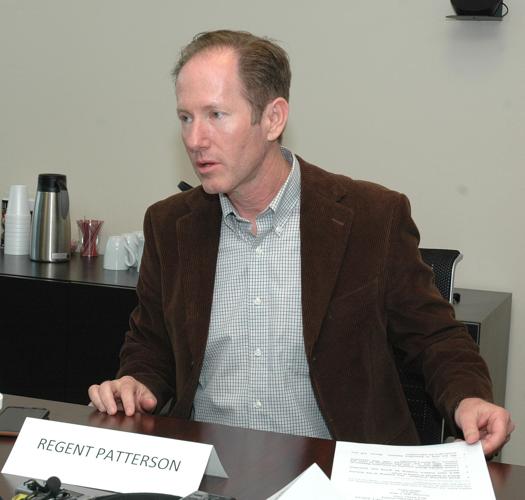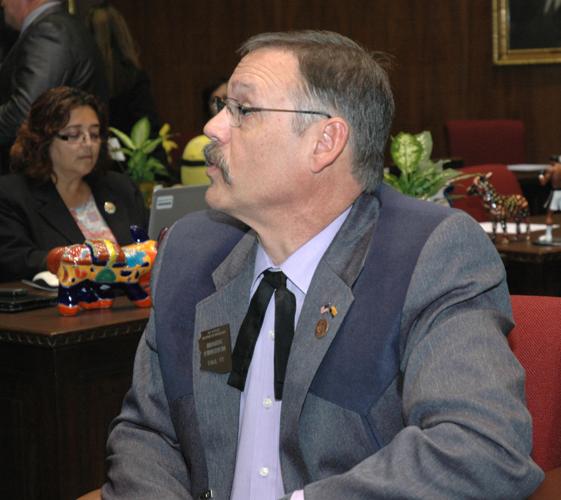PHOENIX — Saying his spat with a lawmaker has become a “distraction,” Greg Patterson is stepping down as chairman of the Arizona Board of Regents and quitting the panel outright.
In a letter to fellow board members released Monday, Patterson said he was “overzealous in my defense of the universities.” Patterson was referring to his behavior over a proposal by Republican state Reps. Mark Finchem of Oro Valley and Jill Norgaard of Phoenix to trim the role of the board and instead give each of the state’s three universities its own oversight agency.
But the meeting with the two in February turned ugly, with Patterson calling the press release about the plan “unprofessional,” particularly among fellow Republicans. It then turned personal.
“You’re from SaddleBrooke?” Patterson said, referring to the heavily Republican Pinal County subdivision that Finchem represents. “I would say the costume doesn’t work,” referring to Finchem’s penchant at times to wear Western-style jackets and ties.
“Trim that down. Buy a suit. Decide where you want to be,” he told Finchem before leaving the meeting.
It was widely known there had been a dust-up between Patterson and Finchem. But the full extent of the conversation was not known until the Arizona Republic obtained an audio recording — one apparently made by Patterson himself on his cellphone — and published the information last week.
The seeds for Patterson’s departure were probably set Friday when Bill Ridenour, the board’s vice chair, publicly distanced himself and the rest of the board from Patterson following the release of the tape.
“While he is free to speak as an individual, he does not speak for me or other members of the board,” Ridenour wrote. “We cannot allow his regrettable remarks and actions to diminish the hard work and outstanding results of the Arizona Board of Regents.”
But Regent Rick Myers said he listened to the entire tape and he contends too much has been made of the February incident. He said Patterson was simply being a “passionate advocate of higher education.”
“He should not have lost his temper, just as all of us as human beings have done in our lives,” Myers said, saying Patterson did not use improper language or call anyone “bad names.”
Instead, Myers said Patterson was simply challenging Finchem “to be on the right side of this issue and he criticized his choice of ties.”
In his resignation letter, Patterson made no specific mention of the February conversation other than his contention he was “overzealous.” Instead, he thanked Jan Brewer who, as governor, appointed him to an eight-year term on the board in 2012, as well as praising current Gov. Doug Ducey for working with the board earlier this year to allow the universities to borrow up to $1 billion for repairs and construction.
Patterson, who did not return calls Monday, also said he has “publicly apologized” to Finchem.
What he did not do, according to Finchem, is actually call the lawmaker himself.
“I have not talked to him since the day of the original occurrence,” Finchem said Monday of Patterson.
But Finchem said he does not necessarily believe that Patterson’s resignation, by itself, will improve relations between the board and himself — or with the Legislature in general.
“I think there’s going to be a lot that needs to be done to rebuild trust,” he said.
And Finchem said he’s not giving up on the legislation he and Norgaard crafted to give each university its own governing board.
Under that plan, the Board of Regents, which is constitutionally created, would remain. But it would have only “general oversight of the university system but not direct oversight of the universities.”
That power would go to a five-member board for each of the schools, with three members appointed by the governor, one by the Senate president and one by the speaker of the House.
What that would resolve, Finchem said, is a board that he called “out of control” in its spending. He contends separate boards, each focused on its own school, would not only rein in costs but also make education more affordable.
Finchem said the Arizona Constitution stipulates that an education “shall be as nearly free as possible.” Yet undergraduate tuition for state residents is now north of $11,000, not counting various fees and surcharges.
In introducing his legislation in January, Finchem told Capitol Media Services that separate governing boards would force schools to compete for students. And he said that would require each to offer a quality education at the lowest possible cost, meaning the schools would have to cut costs — including salaries.
“They continue to consume money like it’s going out of style,” he said. “Enough is enough.”
Finchem said Monday his views on the need to revamp the system have not changed, especially “after taking a look at systems like Oregon and some other states that have moved away from having a single, centralized command-and-control kind of architecture.”
He would not comment specifically on Patterson’s abrupt departure.
“I have much bigger problems to deal with than somebody’s ego,” he said.
But Finchem, serving his second two-year term in the House, said he’s not seeing Patterson’s resignation as some sort of a victory.
“I don’t celebrate somebody’s misfortune, misdeeds, misstatements,” he said. “It’s not in me.”





